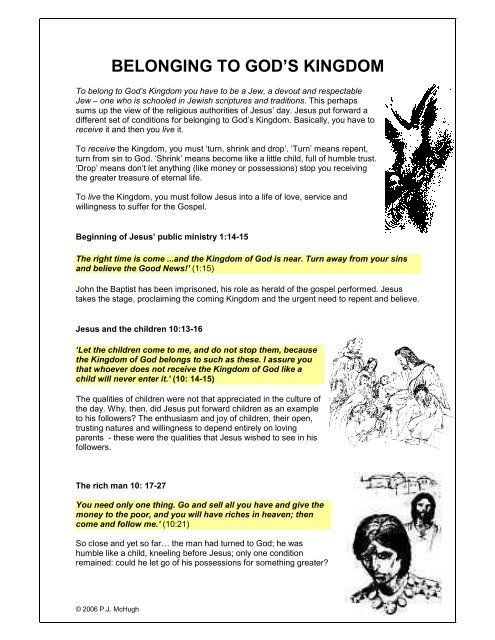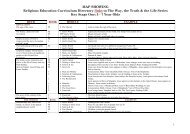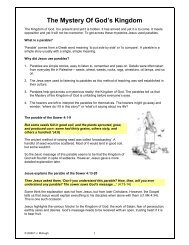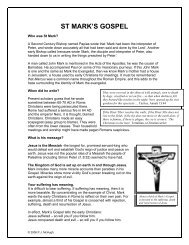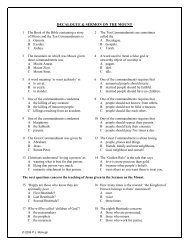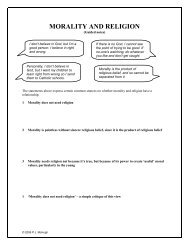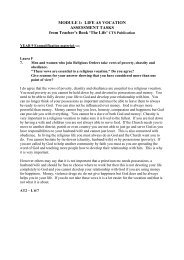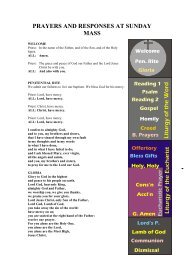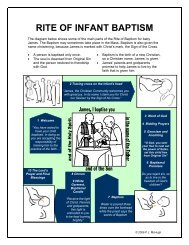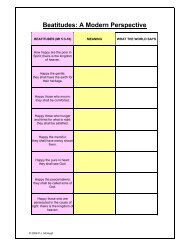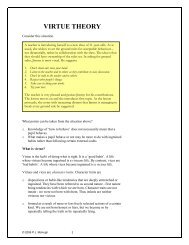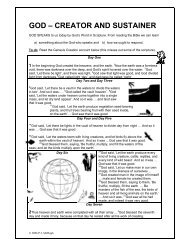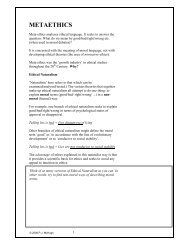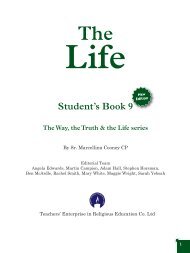Create successful ePaper yourself
Turn your PDF publications into a flip-book with our unique Google optimized e-Paper software.
<strong>BELONGING</strong> <strong>TO</strong> GOD’S <strong>KINGDOM</strong><br />
To belong to God’s Kingdom you have to be a Jew, a devout and respectable<br />
Jew – one who is schooled in Jewish scriptures and traditions. This perhaps<br />
sums up the view of the religious authorities of Jesus’ day. Jesus put forward a<br />
different set of conditions for belonging to God’s Kingdom. Basically, you have to<br />
receive it and then you live it.<br />
To receive the Kingdom, you must ‘turn, shrink and drop’. ‘Turn’ means repent,<br />
turn from sin to God. ‘Shrink’ means become like a little child, full of humble trust.<br />
‘Drop’ means don’t let anything (like money or possessions) stop you receiving<br />
the greater treasure of eternal life.<br />
To live the Kingdom, you must follow Jesus into a life of love, service and<br />
willingness to suffer for the Gospel.<br />
Beginning of Jesus’ public ministry 1:14-15<br />
The right time is come ...and the Kingdom of God is near. Turn away from your sins<br />
and believe the Good News!’ (1:15)<br />
John the Baptist has been imprisoned, his role as herald of the gospel performed. Jesus<br />
takes the stage, proclaiming the coming Kingdom and the urgent need to repent and believe.<br />
Jesus and the children 10:13-16<br />
‘Let the children come to me, and do not stop them, because<br />
the Kingdom of God belongs to such as these. I assure you<br />
that whoever does not receive the Kingdom of God like a<br />
child will never enter it.’ (10: 14-15)<br />
The qualities of children were not that appreciated in the culture of<br />
the day. Why, then, did Jesus put forward children as an example<br />
to his followers The enthusiasm and joy of children, their open,<br />
trusting natures and willingness to depend entirely on loving<br />
parents - these were the qualities that Jesus wished to see in his<br />
followers.<br />
The rich man 10: 17-27<br />
You need only one thing. Go and sell all you have and give the<br />
money to the poor, and you will have riches in heaven; then<br />
come and follow me.’ (10:21)<br />
So close and yet so far… the man had turned to God; he was<br />
humble like a child, kneeling before Jesus; only one condition<br />
remained: could he let go of his possessions for something greater<br />
© 2006 P.J. McHugh
Wealth was traditionally seen as a sign of God’s blessing and favour. The man was living a<br />
righteous life: he kept the commandments faithfully. Jesus brings a new, complete standard<br />
of righteousness -to follow Jesus is to do more than to follow the commandments.<br />
The man’s problem is not money; rather it is his attachment to money. St Paul wrote that it<br />
was not money, but love of money, that is the root of all evil. No one can receive the<br />
Kingdom whilst remaining attached to things.<br />
Jesus must have been as sorrowful as the rich man walking away. He didn’t, however, lower<br />
his demand or try to negotiate. He points out the dangers of wealth, using the famous ‘camel<br />
through the eye of a needle’ comparison.<br />
The Great Commandment 12: 28.34<br />
‘Love the Lord your God with all your heart, with all your soul, with all your mind, and<br />
with all your strength ... Love your neighbour as you love yourself.’ (12:30-31)<br />
To answer the scribe’s question, Jesus uses two passages from the Torah to sum up the<br />
heart of the law: love. The scribe is impressed with the answer, and Jesus tells him he’s not<br />
far from God’s Kingdom. Two questions might be asked: What is love Who is my<br />
neighbour<br />
Love is the one thing that cannot hurt your neighbour, St. Paul wrote. The Greek word he<br />
used was ‘agape’ – a love that doesn’t depend on feelings of affection or attraction. ‘Agape’<br />
love simply wants what is best for another person, even if it costs you.<br />
Your neighbour could well be someone considered an outcast – a sinner, tax collector or<br />
foreigner. Jesus showed by his example of reaching out to them.<br />
The widow at the treasury 12:41.44<br />
‘I tell you that this poor widow put more in<br />
the offering box than all the others. For the<br />
others put in what they had to spare of<br />
their riches; but she, poor as she is, put in<br />
all she had- she gave all she had to live on.’<br />
(12:43-44)<br />
Widows of Jesus’ day could end up on the<br />
scrap heap. The Jewish prophets constantly<br />
reminded people of the plight of the widow, the<br />
orphan and the stranger – simply because<br />
these could miss out and end up neglected.<br />
The Temple treasury collected money for the<br />
upkeep of the Temple. It is not the quantity of<br />
the gift but the quality of the giving that counts.<br />
The poor widow’s act was an example of child-like trust in the goodness of God.<br />
© 2006 P.J. McHugh
Belonging to the Kingdom: For Christians today<br />
Christians believe that no one is barred from entering the Kingdom. Jesus didn’t reserve the<br />
Kingdom for Jews alone, but for all – Jew and Gentile, woman and man, slave and free.<br />
Christianity is a universal, not national, faith.<br />
How do Christians know this They look at the conditions Jesus puts for entry into God’s<br />
Kingdom. Basically, Jesus asks people repent and believe, to become childlike, to put the<br />
Kingdom as your first treasure (to ‘turn, shrink and drop’). These conditions can be met by<br />
anyone at any time.<br />
So what’s stopping everyone being part of God’s Kingdom Answer: human attitudes and<br />
behaviour. The Parable of the Sower sums it up. When people’s hearts are hard like the<br />
path, or shallow like the rocky ground, or torn by worldly concerns, God’s message and<br />
God’s Kingdom cannot live in them.<br />
The passage about the rich man strikes a chord with today’s situation. Many people today<br />
might think it odd that ancient people made idols of gold figures to worship. Christians today<br />
consider that there are idols today more deadly because they’re less obvious and visible. To<br />
put money, power, success, privilege, comfort, or anything else, as your highest priority is to<br />
treat that thing like an idol, something to be worshipped.<br />
Activities<br />
1 Choosing the best ending, answer the following in a sentence each.<br />
‘Whoever does not receive the Kingdom of<br />
God like a child ...’<br />
A will be condemned.<br />
B will never enter it.<br />
C will need to repent.<br />
Jesus wanted his followers to be<br />
A childish.<br />
B childlike.<br />
C children.<br />
Jesus’ first advice to the rich man was about<br />
A obeying the prophets.<br />
B regular worship.<br />
C the commandments.<br />
To be perfect the man was invited to do<br />
what<br />
B give up his wealth and follow Jesus.<br />
C keep the commandments.<br />
D become a Pharisee.<br />
What stopped the man from becoming a<br />
disciple<br />
A money<br />
B hardness of heart<br />
C attachment to money<br />
Jesus said the saving the wealthy will be like<br />
A harvesting thorns among wheat.<br />
B a camel passing through the eye of a<br />
needle.<br />
C building a house with no foundations.<br />
A scribe asked Jesus what was the greatest<br />
commandment of all. How did Jesus reply<br />
A honour your father and mother<br />
B love God and your neighbour as yourself<br />
C keep holy the Sabbath<br />
What led Jesus to praise the scribe<br />
A the scribe had seen the wisdom of<br />
Jesus’ answer<br />
B the scribe had asked a clever question<br />
C the scribe followed the Torah strictly<br />
Jesus would have differed most with the<br />
religious authorities over the meaning of<br />
what<br />
A God<br />
B neighbour<br />
C self<br />
© 2006 P.J. McHugh
2 A confused follower of Jesus has filled in the<br />
questionnaire beside.<br />
Identify each wrong answer and give an<br />
example from the Gospel to show why it’s wrong.<br />
<strong>TO</strong> BELONG <strong>TO</strong> THE <strong>KINGDOM</strong> …<br />
<strong>TO</strong> BELONG <strong>TO</strong> THE <strong>KINGDOM</strong> …<br />
Do I have to be born a Jew<br />
Do I have to be born a Jew<br />
Must I become a Jew<br />
Must I become a Jew<br />
Must I have lived a good life<br />
up to now<br />
Must I have lived a good life<br />
up to now<br />
Yes No<br />
Yes No<br />
Must I be a person looked up<br />
to and respected by others<br />
Must I be a person looked up<br />
to and respected by others<br />
Must I be very educated in<br />
religious matters<br />
Must I be very educated in<br />
religious matters<br />
3 Read again the account of the<br />
Widow at the treasury (12:41-44).<br />
a) Where was the treasury<br />
b) Why did Jesus single the widow out for<br />
such praise<br />
c) Some would say the widow’s act was an<br />
act of suicide. Give two points against this view.<br />
d) Read the account of the Anointing of Jesus (14:3-9).<br />
Write down three key similarities between this account and the Widow at the<br />
Treasury.<br />
© 2006 P.J. McHugh


